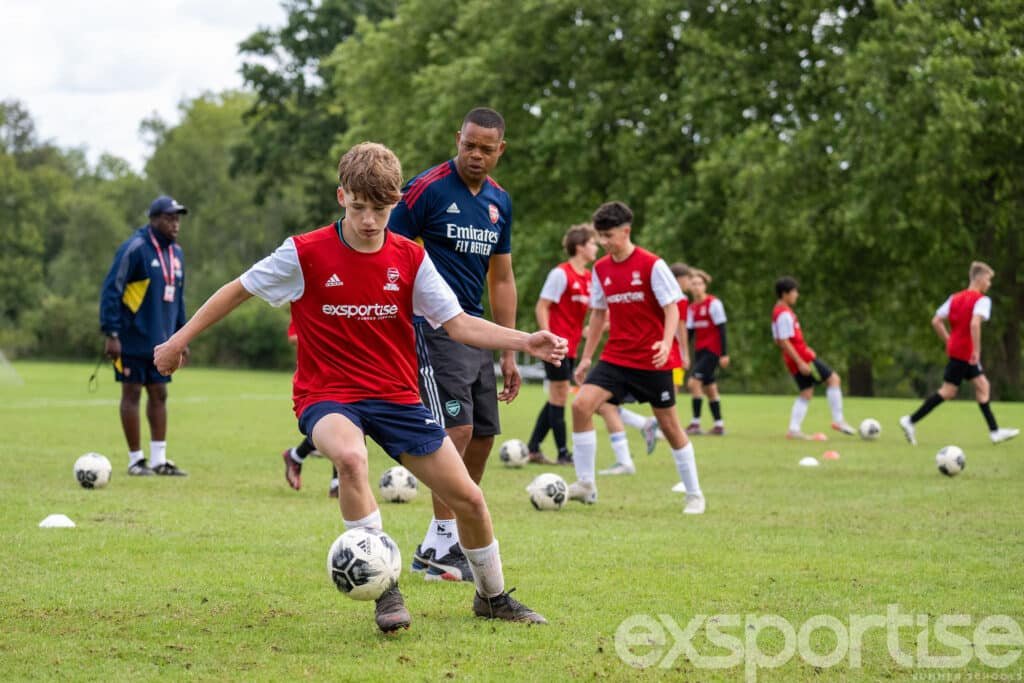School holidays arrive, and suddenly you’re juggling work schedules with keeping your football-mad child engaged and active. It’s a familiar scenario for thousands of parents across the UK. Your child wants to play football, develop their skills, and spend time with other young players who share their passion. But finding the right camp during winter or Easter breaks? That’s where things get tricky.
Winter and Easter football camps offer something remarkable: they transform holiday downtime into focused development periods. Whilst summer camps often grab the spotlight, these shorter seasonal programmes pack serious value. They maintain your child’s fitness during crucial off-season periods, introduce new training methods, and keep that competitive edge sharp when regular team training takes a break.
This guide walks you through everything you need to know about choosing winter and Easter football camps. You’ll discover what separates outstanding programmes from mediocre ones, learn how to match camps to your child’s ability level, and understand the real benefits these intensive training periods deliver. Whether you’re considering your first football camp or you’re a seasoned parent looking for something fresh, you’ll find practical insights here.

Why Winter and Easter Football Camps Matter More Than You Think
Many parents view football camps as convenient childcare with a sporting twist. That’s selling them short. These programmes serve a specific developmental purpose that regular weekly training can’t always provide.
Your child’s football club typically scales back during school holidays. Coaches take breaks, facilities close for maintenance, and structured training disappears for weeks. Meanwhile, your young player’s hard-earned fitness and technical progress can slide backwards. Studies in youth sports development show that even a two-week break can impact muscle memory and cardiovascular conditioning in children aged 8-14.
The Winter Training Advantage
Winter camps tackle this head-on. Running typically from late December through February half-term, these programmes keep players active during the longest break from regular football. The cold months present unique training opportunities too. Indoor facilities allow for focused technical work without weather disruptions. Players develop close ball control in tighter spaces, which directly translates to better on-pitch awareness when outdoor football resumes.
But there’s another angle worth considering. Winter camps often attract more serious players – the ones committed enough to train through December cold or February rain. Your child trains alongside peers with similar dedication levels, which pushes everyone’s standards higher. It’s a different atmosphere from casual summer kick-abouts.

Discover the Marcet Academy camp that takes place in Barcelona in December 2025.
Easter’s Sweet Spot for Skill Development
Easter camps hit differently. They arrive just as the outdoor season intensifies. Your child has been playing regularly, so they’re match-fit and technically sharp. Easter football training programmes use this foundation to layer on more advanced concepts – tactical awareness, position-specific skills, and game intelligence that requires existing fitness to properly absorb.
The timing creates natural progression. Winter camps rebuild and maintain. Easter camps accelerate and specialise. Together, they bookend the season with focused development periods that complement regular club football rather than competing with it.
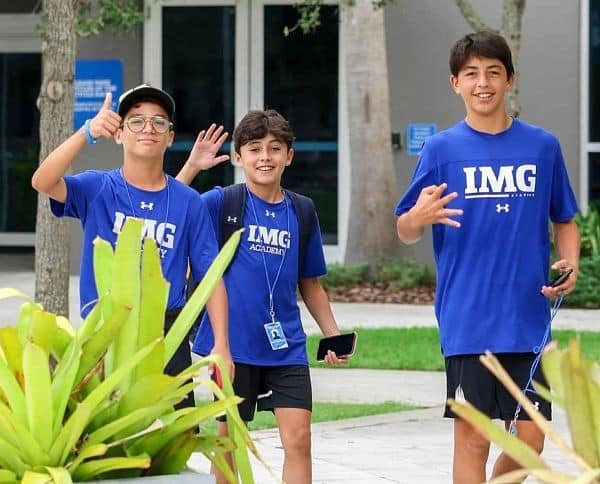
Want to fly to the US? Book now the IMG Academy camp in Florida during Easter 2026.
What Separates Excellent Football Camps from Average Ones
You’ve probably noticed that football camps vary wildly in quality. Some deliver transformative experiences. Others amount to expensive kickabouts in bibs. Understanding the difference saves you money and, more importantly, your child’s time.
Coaching Quality Makes or Breaks the Experience
The coach-to-player ratio tells you loads straight away. Anything above 1:12 means your child gets minimal individual attention. The best camps maintain 1:8 or better, allowing coaches to spot technical flaws, correct them in real-time, and provide personalised feedback that actually sticks.
But numbers alone don’t guarantee quality coaching. Check the qualifications. UEFA B licence should be your minimum standard for lead coaches. Many top camps employ UEFA A or even Pro Licence coaches for specialist sessions. These aren’t just credentials to impress parents – they represent hundreds of hours studying player development, age-appropriate training methods, and modern coaching philosophy.
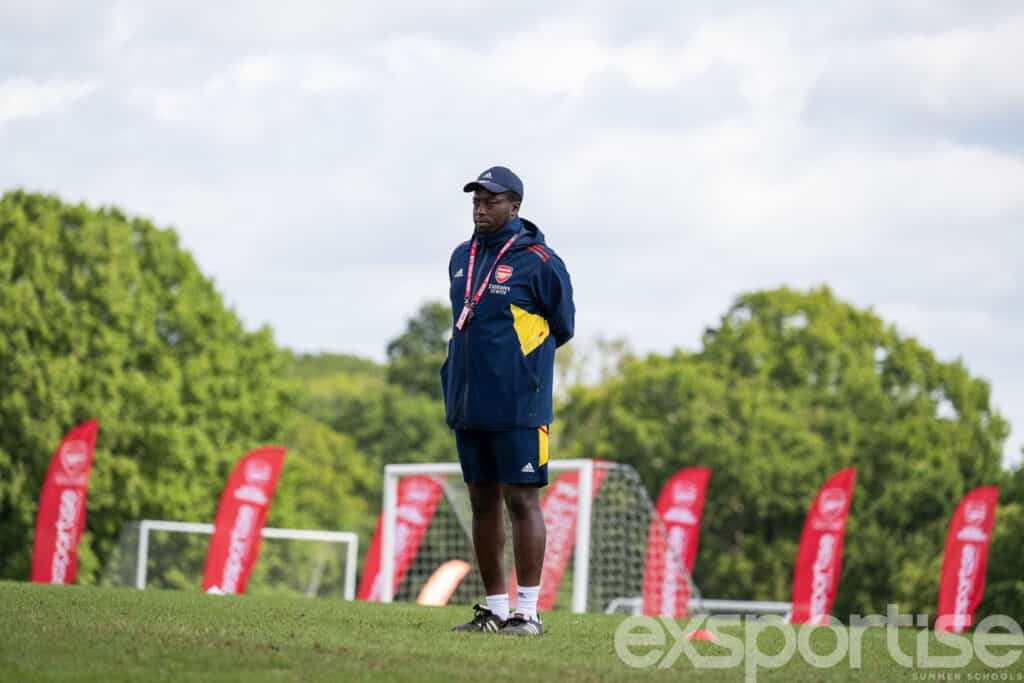
Then there’s coaching style. Phone the camp organisers. Ask about their coaching approach. Progressive programmes use positive reinforcement methods that build confidence whilst correcting mistakes. They create environments where children feel comfortable taking risks and trying new skills. If you’re hearing about “old school discipline” or “toughening kids up,” walk away. That’s not modern coaching – it’s outdated thinking that can damage young players’ relationships with football.
Programme Structure Reveals Professionalism
Outstanding camps follow structured daily schedules that balance different training elements. A typical excellent programme might run like this: technical drills for the first hour when players are fresh, small-sided games for the middle period to apply those skills, and either position-specific work or full matches to finish. This isn’t arbitrary – it’s based on how children learn motor skills and retain information.
Watch out for camps that promise “match play all day.” Yes, children love playing matches. But six hours of unstructured games teaches poor habits and leads to injuries from tired players making bad decisions. The best camps use matches as teaching moments within a broader framework.
Safety and Welfare Standards Can’t Be Optional
This seems obvious, but you’d be surprised how many camps cut corners here. Every camp must have qualified first aiders present – not just “someone who’s done a course,” but staff with current, recognised qualifications. They should have proper emergency procedures, clear safeguarding policies, and adequate insurance.
Ask about their safeguarding measures specifically. All staff should hold current DBS checks. There should be clear policies about changing facilities, photography, and communication with children. If organisers seem vague or irritated by these questions, that’s your red flag.
Choosing the Right Camp for Your Child’s Ability Level
Getting this decision right matters enormously. Place your child in the wrong level, and they’ll either feel overwhelmed or bored silly. Neither outcome serves their development or their love of the game. You can use our filters to choose the right camp adapted to your child’s level.
Understanding Development Stages
Football camps typically split into age bands, but age alone doesn’t determine appropriate level. Your eight-year-old who plays for a competitive academy team needs different provision than an eight-year-old just discovering football. Most quality camps recognise this by offering ability-based groups within age brackets.
For beginners (children with less than a year’s regular football), look for camps emphasising fun and fundamentals. These programmes should focus on basic ball mastery, simple passing patterns, and small-sided games that maximise touches. Your child shouldn’t feel pressure about winning or losing – they’re building foundational skills and, crucially, positive associations with football.
Intermediate players (1-3 years regular football) need camps that challenge without overwhelming. They should be working on positional awareness, combination play, and beginning to understand tactical concepts. Small-sided games remain important, but now there’s structure and purpose behind them. Coaches should be introducing “why” alongside “how” – explaining why we pass here, why we position ourselves there.
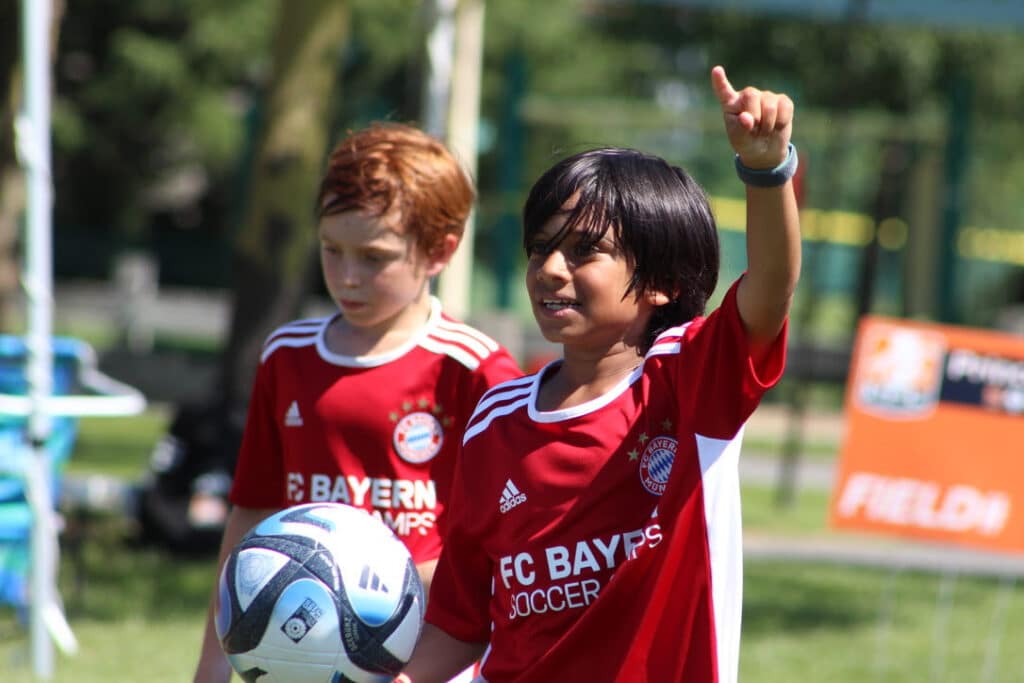
Advanced and Elite Programmes
If your child plays academy football or represents their county, standard camps won’t cut it. They need specialist winter training programmes that assume technical competence and focus on elite development. These camps work on marginal gains – subtle positional adjustments, advanced technical variations, high-level tactical understanding.
Elite camps often incorporate sports science elements too. Video analysis sessions where players review their own performance. GPS tracking to monitor physical output. Strength and conditioning work appropriate for their age. This isn’t overkill – it’s preparing serious young players for the demands they’ll face if they pursue football beyond youth level.
The Trial Session Advantage
Many camps offer trial sessions or taster days. Use them. Watching your child in that environment tells you immediately whether the level’s appropriate. Are they engaged but not overwhelmed? Do coaches notice them and provide feedback? Do other children seem similarly skilled? These observations beat any amount of marketing material.
Practical Considerations That Parents Often Overlook
You’ve found a camp with excellent coaching and the right ability level. Brilliant. But before you book, work through these practical elements that can make or break the experience.
Location and Logistics Matter More Than You’d Think
That fantastic camp an hour’s drive away seems manageable until you’re doing it twice daily in rush hour traffic. Your child arrives tired, leaves exhausted, and nobody enjoys the experience. Within 30 minutes door-to-door is ideal. Beyond 45 minutes, you’re spending more time travelling than training, which defeats the purpose.
Consider drop-off and pick-up times too. Camps running 9am-3pm suit most working parents, but check whether those times are flexible. Some camps charge extortionate fees for early drop-off or late collection – essentially penalising parents for working normal hours. Others build flexibility into their pricing, which shows they understand family realities.
Cost Versus Value Calculation
Football camps range from £50 to £500+ for a week. Price doesn’t automatically equal quality, but the cheapest option rarely delivers excellence either. Break costs down per hour of quality coaching. A £200 week-long camp offering 30 hours of structured training works out around £6.60 per hour. Compare that to your child’s regular weekly training session cost.
Factor in what’s included. Some camps provide all equipment, others expect children to bring balls, bibs, even cones. Meals and snacks vary too – some include lunch and healthy snacks, others offer nothing beyond water. These “extras” add up quickly if you’re providing them separately.
Equipment and Kit Requirements
Check precisely what your child needs to bring. Most camps require:
- Football boots (moulded studs for outdoor, trainers for indoor)
- Shin pads
- Water bottle
- Weather-appropriate training gear
But requirements vary. Some camps provide training bibs; others expect children to bring specific coloured shirts. Indoor camps might prohibit certain boot types that damage surfaces. Getting this wrong means day-one stress you don’t need.
Weather Contingency Plans
British weather doesn’t respect football camp schedules. What happens when Storm Whatever decides to arrive mid-week? Outdoor camps should have indoor backup facilities or wet-weather programmes that maintain value. “We’ll play anyway” sounds admirably tough until your child’s soaked, cold, and miserable for five hours.
Indoor camps sidestep this issue entirely, which makes them worth considering for winter particularly. All-weather 3G pitches split the difference – outdoor feel with weather protection. But verify the backup plan before booking, especially for expensive camps where you’d expect guarantees.

The Hidden Benefits Beyond Football Skills
Most parents book camps for obvious reasons: football improvement and convenient childcare during holidays. Fair enough. But these programmes deliver benefits that extend well beyond better step-overs and improved passing accuracy.
Social Development in Football Environments
Your child meets dozens of new children who share their football passion. These aren’t random classmates with varying interests – they’re fellow enthusiasts who understand why someone would choose football training over lying in during holidays. Friendships form quickly in these intense, shared-interest environments.
But it goes deeper than making mates. Children learn to work with different personality types, adapt to new team dynamics, and communicate with peers they haven’t known for years. These are life skills disguised as football training. Your quiet child who struggles socially often flourishes in football camp environments because the shared activity provides natural conversation starters and common ground.
The age mixing helps too. When camps group by ability rather than strictly by age, your talented ten-year-old might train alongside twelve-year-olds. That exposure to older, more developed players accelerates maturity and understanding. Conversely, older children who struggle technically train with younger but more skilled players, which can rebuild confidence by proving that age doesn’t automatically confer ability.
Building Independence and Resilience
Camps remove parents from the equation for several hours daily. Your child navigates new environments, follows unfamiliar coaches’ instructions, and solves small problems independently. They forget their water bottle – they learn to ask coaches or manage without. They struggle with a drill – they must persist or request help rather than looking to you for rescue.
This controlled independence builds confidence. Children discover they can manage situations without parental oversight. They develop resilience when things don’t go perfectly – perhaps they’re placed in a lower ability group than expected, or they don’t shine in every drill. Learning to handle these small disappointments in safe environments prepares them for bigger challenges later.
Exposure to Different Coaching Philosophies
Your child’s regular coach might be excellent, but they’re one person with one approach. Camps expose players to different coaching philosophies, technical explanations, and tactical perspectives. This variety prevents players from developing narrow football understanding based on a single coach’s preferences.
Sometimes this exposure proves revelatory. A concept your child struggled to grasp from their regular coach suddenly clicks when a camp coach explains it differently. Or they learn an alternative technique that suits their natural playing style better. This isn’t about their regular coach being wrong – it’s about the value of diverse input during development phases.
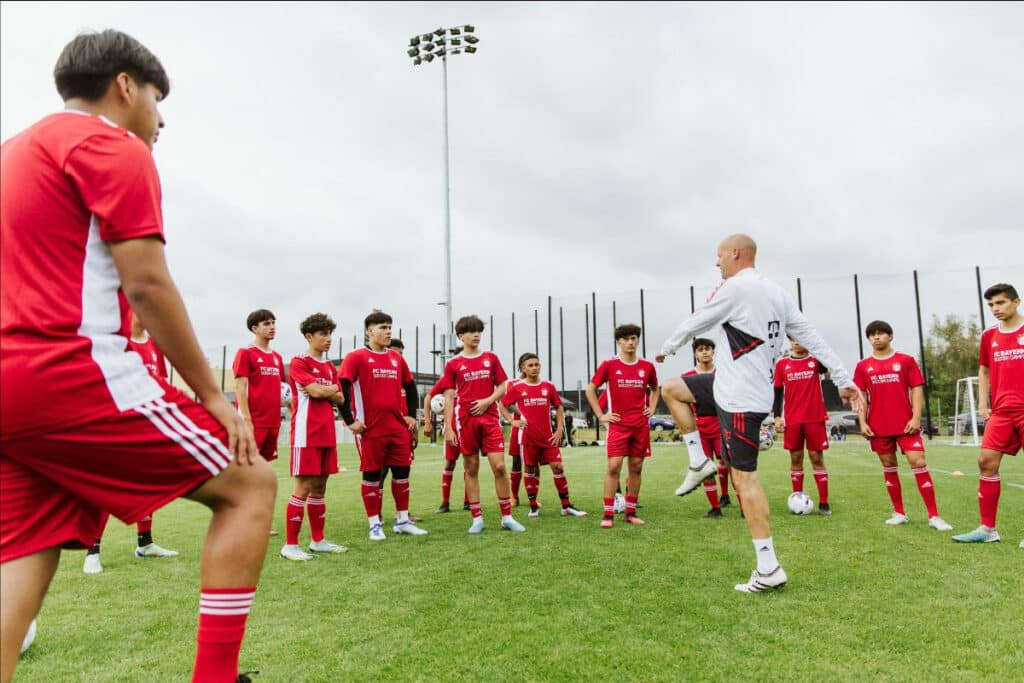
How to Prepare Your Child for Maximum Camp Success
You’ve selected the perfect camp and paid the deposit. Now comes the bit many parents miss: preparation. Sending your child to camp without groundwork is like entering them for an exam without revision – possible, but pointless.
Physical Preparation Matters
If your child hasn’t trained much recently, don’t expect them to handle five consecutive days of intensive football without preparation. Two to three weeks before camp starts, get them active. This doesn’t mean formal training – just regular physical activity. Half-hour kickabouts in the park, playing football with friends, even active games that get their heart rate up.
The goal isn’t peak fitness. You’re preventing the shock of sudden intense activity that leads to injuries, exhaustion, and miserable children who don’t want to return after day one. A moderately active child adapts to camp intensity within a day or two. A completely inactive child suffers.
Setting Realistic Expectations Together
Sit down with your child and discuss what camp involves. Some children expect constant match play and feel disappointed when structured drills dominate. Others worry they won’t be good enough and arrive already anxious. Clear, honest conversation prevents both scenarios.
Explain that they’ll learn new skills, some of which will feel difficult initially. Emphasise that everyone struggles with new techniques at first – that’s literally the point of learning. Frame the camp as an adventure where the goal isn’t being best, but being better by Friday than they were on Monday.
Ask what they’re excited about and what worries them. Their concerns might be practical (what if I need the toilet during training?) rather than football-related. Address these concrete worries with concrete solutions, which reduces general anxiety.
Nutrition and Hydration Planning
Intensive football training demands proper fuel. The night before camp and each morning, ensure your child eats substantial, carbohydrate-rich meals. Porridge, toast, pasta – anything that provides sustained energy. Avoid sending them with just sugary cereals that cause energy spikes and crashes.
Pack proper snacks for breaks: bananas, cereal bars, sandwiches. Not chocolate bars and crisps. Yes, they’re treats, but they’re terrible fuel for active children who need sustained energy for hours of training. Most camps allow children to keep a small bag with snacks and extra drinks at pitchside.
Hydration matters more than most parents realise. Your child should arrive already well-hydrated, not planning to drink water after they feel thirsty. Thirst indicates dehydration has already started. Send them with two water bottles if allowed – one finishes quickly during intensive exercise.

Frequently Asked Questions
What’s the ideal age to start football camps?
Most camps accept children from age 5 or 6, but readiness varies individually. Your child should manage basic following instructions, cope with being away from you for several hours, and genuinely enjoy football. Forcing a reluctant five-year-old serves nobody. Wait until they’re asking to go rather than you pushing them.
How do winter camps differ from Easter programmes?
Beyond timing, they serve different developmental purposes. Winter camps maintain fitness and technique during long breaks from regular football. They’re often more technically focused with indoor elements. Easter camps accelerate development when children are already match-fit, introducing more advanced tactical concepts and specialised position work.
Should I choose camps near our home or travel to specialist academies?
For most children under 12, local quality camps work perfectly well. The convenience factor and familiar environment outweigh marginal coaching differences. For elite-level players aged 13+, travelling to specialist programmes might offer genuinely superior coaching and competitive environments worth the extra effort. Assess realistically whether your child genuinely needs elite provision or would thrive equally well locally.
What happens if my child doesn’t enjoy the first day?
First-day nerves are normal. Nearly every child feels some uncertainty initially. Have a proper conversation about specific concerns – was coaching too hard? Too easy? Were other children unfriendly? Specific problems have specific solutions. General “I didn’t like it” often resolves itself by day two once familiarity develops. If they’re genuinely distressed rather than just uncertain, though, trust your instinct. Not every camp suits every child.
Can beginners attend camps, or are they only for experienced players?
Absolutely beginners can attend – many camps specifically cater to them. The key is choosing camps that explicitly welcome all abilities and group children appropriately. Avoid camps marketed as “elite” or “advanced development” for beginners. They’ll feel out of depth and discouraged. Look for language like “all abilities welcome” or “beginners to advanced” in camp descriptions.
How far in advance should I book football camps?
Popular camps fill up months ahead, particularly for school holiday periods. Book 8-12 weeks in advance for decent choice. Last-minute spaces sometimes appear through cancellations, but you’re taking a chance. Christmas and Easter camps fill especially quickly since they align with natural breaks when parents need childcare solutions alongside football development.
Are residential camps better than day camps for development?
Not necessarily. Residential camps suit children comfortable being away from home and offer more total training hours. But they’re significantly more expensive and the separation doesn’t suit every child or every family situation. Day camps deliver excellent development without the overnight element. Choose based on your child’s maturity and your family circumstances rather than assuming residential automatically means better.
Making Your Decision
You’ve got the information. Now comes the choice. Start by listing your non-negotiables: location limits, budget constraints, dates that work for your family. These practical filters narrow options quickly.
Then involve your child in shortlisting camps that meet your criteria. Show them camp websites, read descriptions together, watch any promotional videos. Their enthusiasm matters. A slightly less prestigious camp your child genuinely wants to attend beats a “better” camp they’re being dragged to reluctantly.
Contact shortlisted camps directly. Ask questions. How do they handle different ability levels within age groups? What’s their coaching philosophy? What happens in bad weather? How they respond tells you loads about professionalism and communication standards. Camps that answer thoroughly and patiently value parents as partners in their children’s development.
Read recent reviews from other parents, but take them with perspective. One terrible review among dozens of positive ones might reflect a unique situation rather than standard experience. Patterns matter more than individual opinions. If multiple reviews mention the same concern – perhaps poor organisation or limited feedback – that’s worth noting.
Trust your instinct. You know your child better than anyone. That feeling in your gut about whether a camp seems right often proves accurate. Sometimes the technically “best” option doesn’t suit your specific child’s personality, learning style, or current needs. And that’s fine.
These camps represent more than convenient childcare or football skill development. They’re investing in your child’s physical confidence, social development, and lifelong relationship with sport and physical activity. That’s worth getting right rather than rushing into the cheapest or nearest option.
The beautiful thing about winter and Easter football camps? They repeat annually. Even if this year’s choice doesn’t prove perfect, you’ve learned what works and what doesn’t for next time. Every experience teaches something – and that’s true for both you and your young footballer.

